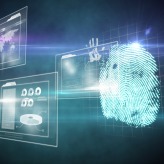 Many people in developing countries have limited access to high quality healthcare services. This is due to the fact that healthcare workers in remote areas have difficulty in identifying patients, who may have no birth certificate or passport, and whose medical records have previously been written on paper. This is where SimPrint come in – to provide healthcare staff easier access to the medical records for patients in the developing world.
Many people in developing countries have limited access to high quality healthcare services. This is due to the fact that healthcare workers in remote areas have difficulty in identifying patients, who may have no birth certificate or passport, and whose medical records have previously been written on paper. This is where SimPrint come in – to provide healthcare staff easier access to the medical records for patients in the developing world.
Designed by a team of British postgraduate researchers, SimPrint is a miniature fingerprint scanner synced with a healthcare worker’s smartphone via an application that identifies a patient’s records.
How it works
SimPrint’s core function is to retrieve patients’ medical records via a quick, on-the-spot fingerprint scan. The device doesn’t actually hold the records itself – it merely connects with them via mobile apps, syncing information between the user’s smartphone and the server. The SimPrint system downloads and keeps a patient’s data in local storage on the phone, which means that healthcare workers can update medical records offline, even in areas with limited mobile connectivity.
The researchers have also been keen to protect user security and privacy. That’s why they make sure SimPrint never transfers raw fingerprint images, and employs powerful data encryption when information is transmitted between the phone and server, in order to prevent potential data breaches.
The features
- Hardware – SimPrint’s hardware design consists of a double-layered circuit board, fingerprint sensor, and Bluetooth 2.0 module.
- Connectivity – SimPrint can connect to any Bluetooth 2.0 compatible phone via a wireless network.
- Compatibility – SimPrint can seamlessly integrate with nearly any smartphone device.
- Security – SimPrint uses the same level of encryption found in online banking and financial systems.
- Price – The SimPrint device costs $40 per piece, a price that healthcare organizations can afford.
Challenges
New healthcare devices are often faced with usability challenges, and SimPrint developers are currently working on improving the fingerprint recognition of infants, who have fewer unique identifiers on their fingerprints, and laborers whose rough hands could make getting a print difficult.
The British postgraduates received funding from the Gates foundation, established by Microsoft founder Bill Gates to improve global healthcare. Although SimPrint is in its early stages of testing, it is a promising and valuable tool in healthcare outreach in the developing world.
Looking to implement new technologies in your healthcare business? Drop us a line today and see how we can help.